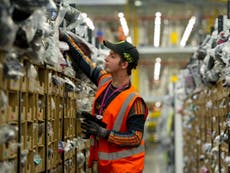What is likely to happen to the UK economy this year and what can be done about it?
The recovery is slowing down and GDP is expected to remain well below pre-pandemic levels for the rest of the year – that will have a big impact on people’s livelihoods

Your support helps us to tell the story
From reproductive rights to climate change to Big Tech, The Independent is on the ground when the story is developing. Whether it's investigating the financials of Elon Musk's pro-Trump PAC or producing our latest documentary, 'The A Word', which shines a light on the American women fighting for reproductive rights, we know how important it is to parse out the facts from the messaging.
At such a critical moment in US history, we need reporters on the ground. Your donation allows us to keep sending journalists to speak to both sides of the story.
The Independent is trusted by Americans across the entire political spectrum. And unlike many other quality news outlets, we choose not to lock Americans out of our reporting and analysis with paywalls. We believe quality journalism should be available to everyone, paid for by those who can afford it.
Your support makes all the difference.It is almost unheard of for the UK economy to grow 6.6 per cent in a single month, as it did in July, but it would be wise not to break out the bunting just yet.
After the biggest downturn on record, the country has still recovered only around half of the output lost between February and May. Growth began to slow in July as some of the “easy wins” resulting from businesses reopening after lockdown became fewer and farther between.
But things have moved substantially since then, so what might be in store for the rest of the year?
The economy will have grown further in August but we don’t yet know how much. The consensus is that it will remain at least 5 per cent below February’s level, which would be a huge economic blow with significant consequences for people’s livelihoods.
Early indicators give us an idea of how that abstract number might impact people’s lives.
One thing we can say with certainty is that more people will lose their jobs in retail and hospitality. Last week, the number of people visiting high streets and shopping centres remained a little below 75 per cent of last year’s level.
This level is now basically flat, suggesting that the final 25 per cent might not come back for a while, if at all. Some people, particularly those most worried about the virus, have changed their routine.
Confidence that the government has the virus under control is low, and there will also probably be more local lockdowns to come.
These factors combined will cause a lot more pain for retailers, who employ more than 2 million people. They are trying to quickly refocus on online shopping and reduce costs but job cuts are inevitable, while sales at Amazon are likely to benefit.
More encouragingly, the engine behind the UK economy, consumer spending, returned in August to last year’s level as people enjoyed “staycations”, according to Barclaycard payments data.
National figures hide big local variations. While city centres remain quieter than before, there are anecdotal reports of restaurants in suburban areas experiencing their busiest August in recent memory.
People are shunning long journeys, particularly on public transport. Some 36 per cent of people are still working from home, according to Office for National Statistics surveys.
This redistribution of where and how we spend our money is not seamless. There is friction. Businesses will go under and can’t simply crop up elsewhere. Nor can many workers who lose their jobs. The challenge is to soften these blows by helping to facilitate the shift from old patterns of working to new ones.
The chancellor’s biggest concern is the prospect of huge lay-offs when the furlough scheme ends. At the height of lockdown the government was covering wages of around a third of workers. Now it is down to 11 per cent.
However, that is still more than 3 million people. Then there are millions more who have never been entitled to any support – many of them freelancers who still have no work.
The government is offering employers a one-off payment of £1,500 for each furloughed worker they keep on until 31 January. Some employers will do their sums and realise it’s not worth it. Heightened uncertainty around a Brexit trade deal will not help instil confidence in employers that they can afford a bigger wage bill in future.
The TUC has proposed a “short-time” working subsidy, which would mean employers are paid to keep on staff part time whose jobs are under threat.
So rather than having, say, 100 workers laid off, on benefits and struggling to find a new job, working hours are redistributed among a few hundred staff who are all kept on part time while being trained in new skills. It is not just union voices urging change. Rishi Sunak is now facing calls from across the political spectrum for targeted support for jobs. The Treasury Committee, which is chaired by a Conservative, asked the chancellor to “carefully consider” extending the furlough scheme and offering help for those still affected.
But the government is worried about the growing tab. It is planning to ease off the spending taps and put its faith in market forces to pick up the slack. The prime minister told the House of Commons last week that people were “languishing out of work” and being kept in “suspended animation” by the furlough scheme.
Furlough had already cost £40bn, he repeatedly pointed out. Enough is enough.
This suggests a misunderstanding of the problem. The best way to restore the public finances, most experts agree, is to support the economy which, after all, is the source of all tax revenues.
Furlough money doesn’t disappear. It circulates in the economy, it’s the oxygen that keeps businesses and jobs alive.
Real interest rates are negative, meaning that investors desperate for a safe place to put their money are essentially paying the government to take it. Many analysts think it makes sense to borrow that money in order to preserve the economy.
More joblessness would compound the country’s economic woes by putting large numbers of people on the dole. They would still be funded by the state but at rates as low as £90 a week, leaving many people on the breadline and queuing at food banks rather than spending money; millions more people who cannot buy from the businesses they’ve just been fired from.
Second, there are viable industries employing skilled workers who through no fault of their own cannot open because of social distancing rules.
Many arts, entertainment, night clubs, theatres and music venues are closed. But people still want to do all of these things.
These are things that the UK is very good at. Decades of work have gone into building up those industries into world leaders.
If venues are shut down, value is destroyed that may never come back. Skills are lost as people give up being a lighting technician, a comedian, a DJ or an actor, to become a delivery driver.
Simply telling people to get back to work does not mean they will have jobs to go to. Vacancies are now at half their average level in 2019.
This is not only the case with jobs most affected by social distancing. The problem is more acute in smaller towns and more rural areas. What is a single mother who works in retail to do if they lose their job and there are none available locally, for example? Relocating 100 miles away for a job at an Amazon warehouse may not be an option.
In other words, there is a strong argument that spending money on jobs and training now will be a good investment. The alternative could be disastrous.




Join our commenting forum
Join thought-provoking conversations, follow other Independent readers and see their replies
Comments